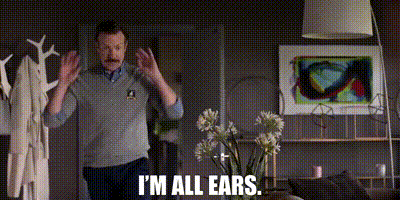Listen Up!
On the other side of asking powerful questions is listening—to what people say with an open mind and heart.
Here is what good listening is and isn’t.
—What it is—
Creating conditions where the other person feels heard:
This can be a lot of things, not the least of which are the following.
Staying curious and present, checking our reactions and breathing through them so we respond effectively
Assuming good intentions
Holding our own points of view loosely
Maintaining a neutral, non-judgmental perspective
Saying what you heard to confirm you heard it right:
Parroting back word for word what someone has said can seem unnatural. But reflecting back what we heard, in our own words, and asking if we got it right assures us and them that we’re on the same page.
Acknowledging the other person:
Looking for where the person showed courage, openness, or vulnerability and saying it to them is an act of generosity and, as long as it’s sincere, creates connection.
—What it isn’t—
Thinking about what you’ll say next:
Who’s brain doesn’t do this? I know mine does.
It takes mindfulness to notice when we’re rehearsing and not listening.
Practice sustained listening in low stakes, everyday situations (For example— how long can you stay present listening to the radio or to your 5 year old telling you about her day before you get distracted?)
Interrupting or talking over:
Listening can test our patience, especially if someone’s story goes on. Rather than wrestling over the talking space, try this:
If you’re getting lost in someone’s story, ask if you can pause them and then ask a powerful question to refocus the conversation
Turning the focus back on us: Sometimes we do this to try to connect with the other person (“I too am a suffering soul!”) and sometimes we do this because we’ve lost touch with our empathy. To fast track empathy ask yourself:
What is it like to walk in their shoes?
What do they need right now? Which leads to…
Problem solving & giving advice before we’re asked for either: These habits likely come from a sincere desire to be helpful. But too often our rush to problem solve and give advice is self-serving: we get to be right, we get the gratification of adding value, we get the reassurance that we’re useful. Before you jump in, ask the other person:
What do you need right now? Sometimes, oftentimes, they just need to feel heard.
And you’ll be there to listen.
Love,
Patty

